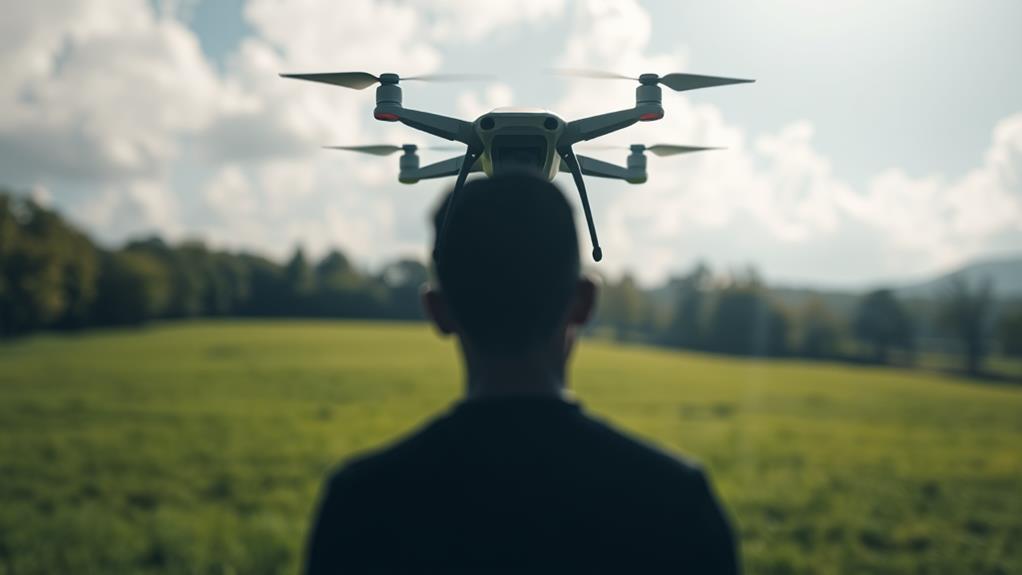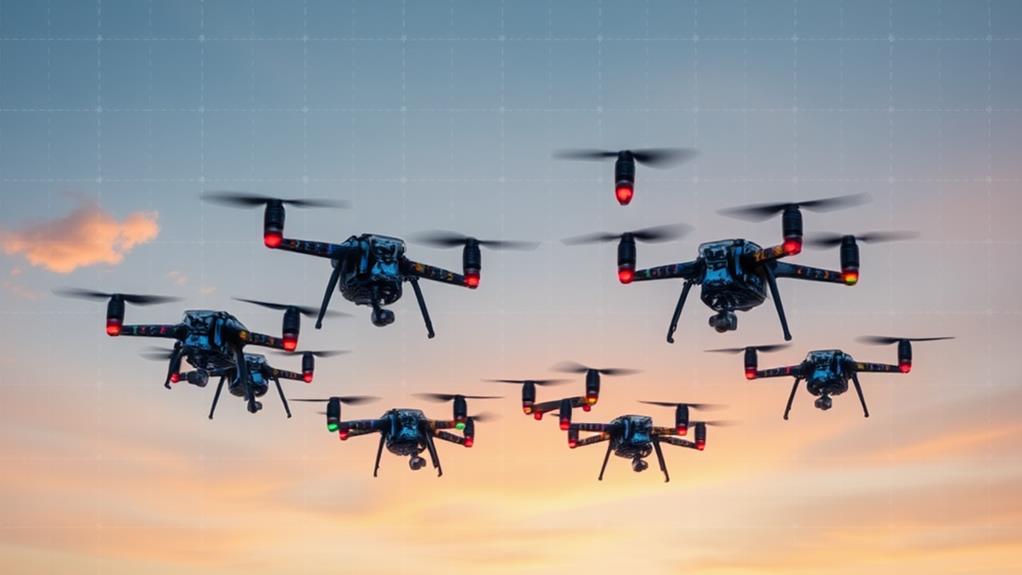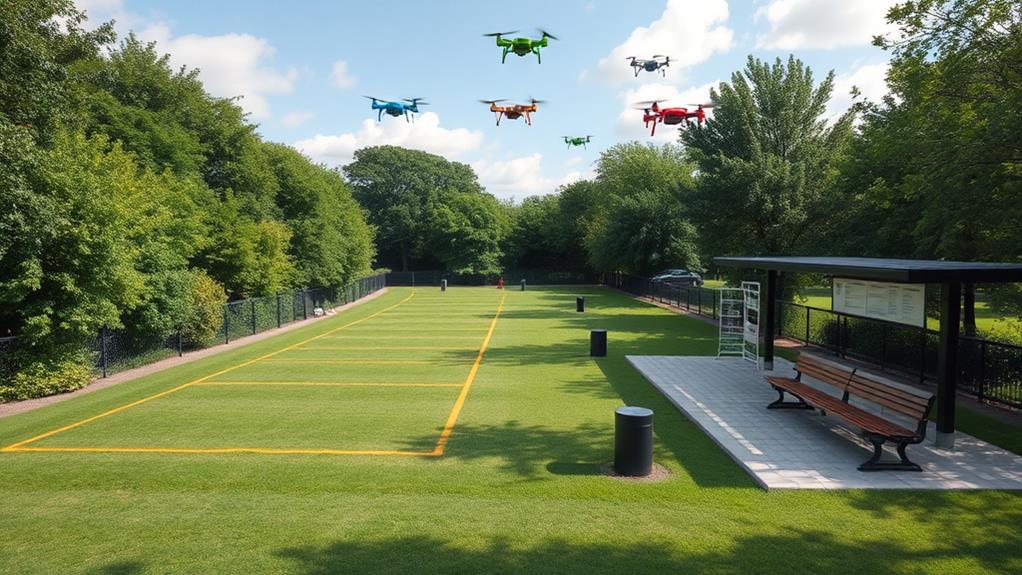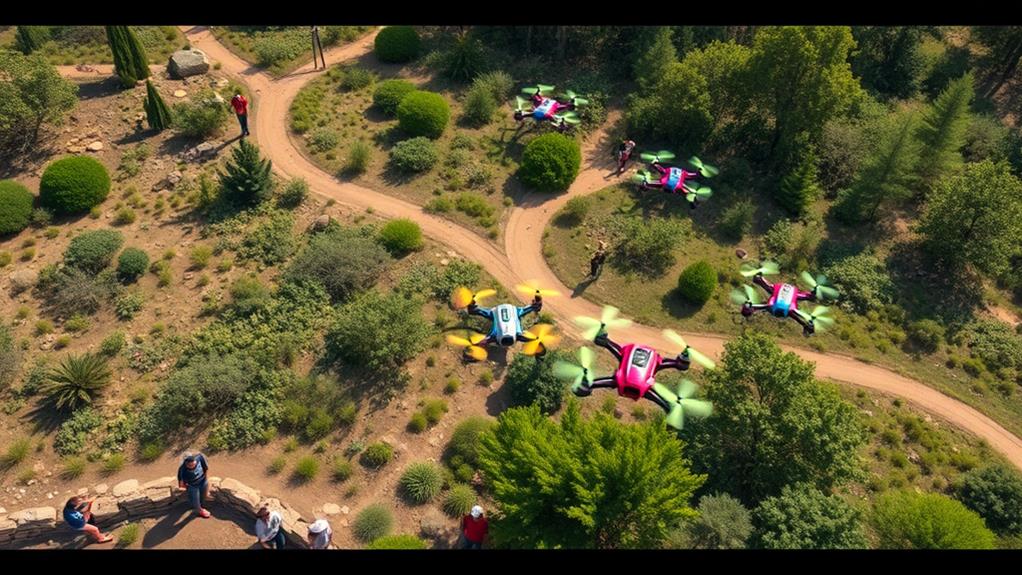When considering drone sports regulations, five key ethical factors stand out. First, guarantee privacy protections for all participants by implementing consent mechanisms for aerial footage. Second, establish safety protocols with no-fly zones and altitude restrictions to minimize risks. Third, promote transparency in operations, informing the public about data usage and flight paths. Fourth, address environmental impacts by regulating noise and protecting sensitive habitats. Finally, foster community engagement, allowing local input and feedback to build trust. These considerations create a safe and respectful environment for drone sports, and you'll discover even more insights as you explore further.
Privacy Protections for Participants

Privacy is a fundamental concern in the domain of drone sports, especially as technology advances and high-resolution cameras become commonplace. These drones can inadvertently capture images of athletes and spectators, raising significant privacy concerns that demand your attention.
It's vital to implement ethical considerations that prioritize responsible use of drone technology in sports environments. Understanding drone operations and capabilities is imperative for pilots to avoid unintentional privacy violations while flying in sports contexts.
To protect participants, consent mechanisms should be established, guaranteeing that everyone involved understands and agrees to any aerial footage being taken. This approach not only respects individual privacy rights but also builds trust among athletes and organizers.
Additionally, regulatory frameworks must include specific provisions to limit drone operations in areas where athletes expect privacy, such as locker rooms and practice facilities.
Moreover, it's important to develop clear policies regarding the use and storage of drone-captured footage. This guarantees that personal data isn't misused or shared without explicit permission.
By addressing these privacy concerns, you contribute to a more respectful and ethical atmosphere in drone sports, allowing everyone to enjoy the excitement without compromising their privacy.
As technology evolves, maintaining robust privacy protections will be key to fostering a responsible and ethical drone sports community.
Safety Protocols and Risk Management
Ensuring safety in drone sports requires implementing robust protocols and risk management strategies that protect both participants and spectators. To minimize risks of drone collisions during events, establishing no-fly zones and altitude restrictions is essential. These measures help maintain public safety while enhancing the overall experience for everyone involved.
Additionally, it's important to familiarize drone operators with local UAV regulations, as different regions have varying flight rules that must be adhered to.
Regular maintenance checks and clear operational guidelines for drones can greatly reduce the likelihood of mechanical failures that might lead to accidents. Additionally, establishing direct communication lines between drone operators and event coordinators is crucial for real-time monitoring. This approach enhances situational awareness, allowing for rapid responses to potential incidents.
Training for drone operators should encompass safety management and emergency response strategies, ensuring they're prepared for unforeseen circumstances at events. Utilizing geofencing technology can also be a game-changer, effectively preventing drones from entering restricted areas, thereby promoting responsible integration into the overall event framework.
Transparency in Drone Operations

Transparency in drone operations plays an essential role in fostering public trust, especially when it comes to how data collected by drones is utilized. When you know how data is gathered and used, it alleviates concerns about privacy and safety, particularly among athletes and spectators. Clear communication about the drones' intended use, capabilities, and limitations helps everyone feel more secure.
Additionally, it's vital for drone operators to comply with registration guidelines to guarantee that all operations are safe and accountable.
To enhance transparency in drone operations, operators should establish protocols for informing communities about their activities, including flight paths and schedules. This approach fosters accountability and reduces misunderstandings.
Regulatory frameworks must require operators to disclose the technology used in their drones, such as surveillance capabilities. This transparency addresses ethical issues surrounding privacy rights and guarantees compliance with ethical standards.
Moreover, public access to information about incidents or accidents involving drones is vital. It not only enhances transparency but also encourages responsible drone usage in sports contexts.
Environmental Impact Considerations
When you think about drone sports, it's easy to overlook their environmental impact. However, these flying machines can greatly affect local ecosystems if not managed properly. To guarantee responsible usage of drones in sports, regulations are necessary.
Here are three key considerations:
- Noise Pollution: The noise generated by drones can disrupt wildlife, affecting their behaviors and habitats. Implementing noise reduction technologies can help minimize this disturbance, allowing both drones and nature to coexist.
- Soil Erosion and Habitat Disturbance: Drones flying over sensitive areas can lead to soil erosion and disturb local wildlife habitats. Regulations should include guidelines on flight altitudes and establish no-fly zones to protect these vulnerable ecosystems.
- Environmental Assessments: Before any drone operations, conducting environmental assessments is vital. These evaluations help identify potential impacts on local flora and fauna, allowing for proactive measures to mitigate harm.
Community Engagement and Trust

Building community engagement around drone sports is imperative for fostering trust and addressing concerns. When local communities participate in discussions about drone operations, it creates transparency, easing worries about privacy and safety. Surveys show that 67% of sports fans are interested in drone footage, highlighting a unique opportunity to engage the community through innovative technology.
Hosting workshops and informational sessions can help educate the public about the ethical and legal aspects of drone usage in sports. This not only promotes understanding but also cultivates a sense of inclusion.
By collaborating with community leaders and stakeholders, sports organizations can develop guidelines that guarantee responsible drone operations while respecting local values.
Establishing clear communication channels between sports organizations and the community is essential. This openness enhances trust and allows communities to provide feedback on drone operations during events.
When everyone feels heard, it strengthens the relationship between drone sports and local residents. Ultimately, fostering community engagement is critical for creating a supportive environment where drone sports can thrive, confirming that concerns are addressed and that everyone can enjoy the benefits of this exciting technology.
Conclusion
In conclusion, establishing ethical drone sports regulations is like crafting a sturdy bridge—it connects innovation with responsibility. By prioritizing privacy, safety, transparency, environmental impact, and community trust, we can guarantee that drone sports not only soar but do so with integrity. As these aerial competitions take flight, your engagement in these discussions will help shape a future where technology and ethics harmonize, creating an exhilarating experience for all involved while safeguarding our values.

Leave a Reply